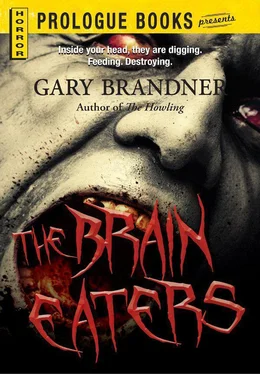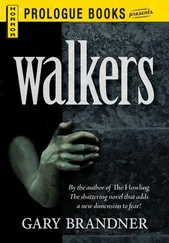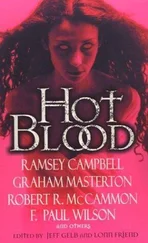The clamor for martial law was nationwide now as fear of the brain eaters surpassed fear of a police state. However, the president was strangely silent. There was a rumor that he and several cabinet members were themselves victims of the brain eaters. It was questionable, anyway, what good martial law would do as the parasites decimated the troops who would have to enforce it.
The Herald building was a ghost — cold and empty and silent. A man sat out in front on the sidewalk with his arms wrapped about his knees. Corey recognized him as one of the Herald ’s pressmen and started to get out of the car to speak to him. Then he saw the terrible pain and incipient madness on the man’s face and quickly drove off. He headed for the apartment building where Doc Ingersoll had lived for almost thirty years.
The Dorchester Apartments, on the fringe of downtown, were housed in a weather-stained brick building constructed in the solid square lines of the early part of the century. The residents were as permanent as the building. The only vacancies appeared when someone died.
There were plenty of vacancies now.
An old building like the Dorchester had none of the security frills of the 1980s. When it was built, the caller at your door would be someone you knew, not a killer or rapist.
Corey entered the building, climbed two flights of stairs, and made his way down a hall of oft-painted doors where the odors of meals past lingered like cobwebs in the air. He found the number of Doc’s apartment and knocked on the brown-painted panel. Inside there was a thump, a muttered curse, and shuffling footsteps approaching the door.
Doc Ingersoll opened the door and squinted through a curtain of cigarette smoke. He wore the pants of his dark gray suit and an undershirt. On his feet, a pair of worn leather slippers. He badly needed a shave.
“Corey?”
“Who else? You look terrible.”
Doc’s apartment consisted of a combination living room and bedroom, with a curtained-off kitchenette. It had the seedy, comfortable look of the home of a man who has lived alone a long time. There were dishes stacked in the sink, and the ashtrays were in their usual state of overflow, but the place was reasonably clean.
Doc spoke in a strained voice. “What are you doing in town?”
“I needed a day off. Curious about what’s happening in the world.”
“I thought most of it was happening up there at Biotron. From what I read, you people are expecting to come up with an antidote any day now.”
“That’s just the standard bullshit I put out for the pool reporters. ‘There are no suspects at present, but an arrest is expected momentarily.’”
“I thought it sounded familiar.” Doc walked back into the room and eased himself down on the edge of the unmade pull-down bed. What’s the real story?”
“Not much. They think they may have discovered a blood test to show whether the brain eaters are into you. But even if they know you’ve got ‘em, they can’t do anything about it.”
“I didn’t read about that. The test.”
Corey snorted. “Dr. Kitzmiller doesn’t want it published before they’re sure it works. Give the people false hope or some damn thing. If you ask me, false hope is better than no hope at all.”
“Yeah.” Doc started to cough. He reached automatically for a fresh cigarette.
“Are you all right?” Corey said. “You really don’t look good.”
“When did I ever look good?” Doc growled. He lit the new cigarette, inhaled, coughed.
“You wouldn’t have a beer, would you?” Corey said.
“Help yourself.” Doc gestured in the direction of the noisy old Philco refrigerator.
Corey took a can of Heileman’s from the refrigerator. He held one out toward Doc, who shook his head. Corey returned the second can and came back to sit in a worn chair next to the bed.
“So what are you doing to keep busy these days? I see the Herald ’s buttoned up.”
“I got myself assigned to the press pool. There isn’t much work for me with so many newspaper guys out of a job, but at least I can keep in touch with the action.”
“What is the action, Doc? All I get is the same kind of shit I hand out.”
“You saw the city when you came in?”
“Yeah. Depressing.”
“That’s about the way it is everywhere. Vital services are still operating, but for how long, nobody knows. Only a few stores are open. The emergency rationing program is working about as well as expected. Meat is in short supply. Gasoline is the biggest headache. What did you drive in on, by the way?”
“They have their own underground tanks at Biotron.”
“You’ve got it made, buddy. Your own gas supply, plenty to eat, medical help all around you, the government taking care of you … What are you doing back here, anyway?”
“I don’t belong there, Doc. I think Zachry gave me the job just to keep me out of the way.”
“Count your blessings. Did you hear Eichorn’s dead?”
“No. How?”
“Burned to death in his house in Houston. Nobody used the story, but his daughter was a brain-eater victim. Went crazy and attacked the family with a hatchet. Then she set fire to the place. They think Eichorn was dead before the flames got to him.”
“Jesus,” Corey swore softly.
“Porter Uhlander, now, he’s gone fishing.”
“You’re kidding.”
“Nope. He loaded his gear along with a case of Tums and a lifetime supply of Valium into his camper and took off for that cabin he kept up on Pelican Lake. He plans to ride out the emergency right there.”
“That’s the silliest thing I ever heard.”
“I don’t know. It makes as much sense as what a lot of other people are doing.”
“Are you going into the pool headquarters?” Corey asked. “I’d like to see the operation.”
“Nah, they don’t need me there.”
“Then what do you say we find a bottle somewhere and get drunk? I’m locked up with a bunch of white-wine drinkers at Biotron.”
“I’m going to pass, Corey. I just don’t feel like doing a damn thing. You go on down to the pool. You might find some laughs.”
Corey looked at the older reporter curiously but said nothing. He got up and started for the door. “I’ll give you a call before I leave town.”
“Sure. You do that.” Doc Ingersoll made no move to get off the bed.
Corey left the apartment and closed the door softly behind him. He walked down the steps feeling depressed. Behind one of the doors on the first floor a woman sobbed.
• • •
The headquarters of the media pool had been set up in the Civic Auditorium. As he drove carefully across town, Corey wondered about Doc’s deteriorating state of mind. It was especially unlike him to turn down a drink. Corey resolved to call him again before leaving town, but now he needed his full attention on his driving.
Desks and portable partitions had turned the auditorium into a haphazard maze. There was much activity, with people rushing back and forth, but Corey got the impression that little was being accomplished. He searched out newspaper people he knew and from them got a little clearer picture of the national situation.
Cures were the current rage. Quacks of all kinds were trumpeting that they had discovered the one and only cure for the brain eaters. The cures ranged from simple electric shock and exotic herbs to various mystical foolery. Although they were not even reported by the pool, these self-proclaimed healers were doing a booming business on word-of-mouth. The Food and Drug Administration had too many other problems to worry about shutting them down.
There was a one-paragraph story on the UPI wire about a delegation of Russian agricultural experts who had changed their plans to fly home from San Francisco and were delaying their departure for unstated reasons. The item caught Corey’s eye only because of Kitzmiller’s charge that these same Russians were somehow to blame for loosing the brain eaters. He tucked it away for future consideration.
Читать дальше












